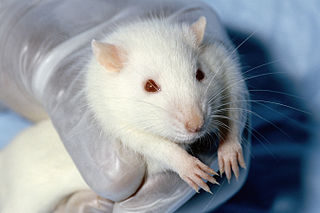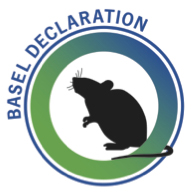
A model organism is a non-human species that is extensively studied to understand particular biological phenomena, with the expectation that discoveries made in the model organism will provide insight into the workings of other organisms. Model organisms are widely used to research human disease when human experimentation would be unfeasible or unethical. This strategy is made possible by the common descent of all living organisms, and the conservation of metabolic and developmental pathways and genetic material over the course of evolution.

Animal testing, also known as animal experimentation, animal research, and in vivo testing, is the use of non-human animals, such as model organisms, in experiments that seek to control the variables that affect the behavior or biological system under study. This approach can be contrasted with field studies in which animals are observed in their natural environments or habitats. Experimental research with animals is usually conducted in universities, medical schools, pharmaceutical companies, defense establishments, and commercial facilities that provide animal-testing services to the industry. The focus of animal testing varies on a continuum from pure research, focusing on developing fundamental knowledge of an organism, to applied research, which may focus on answering some questions of great practical importance, such as finding a cure for a disease. Examples of applied research include testing disease treatments, breeding, defense research, and toxicology, including cosmetics testing. In education, animal testing is sometimes a component of biology or psychology courses.

Labcorp Drug Development presently known as Fortrea is a contract research organization headquartered in Burlington, North Carolina, providing nonclinical, preclinical, clinical and commercialization services to pharmaceutical and biotechnology industries. Formerly called Covance, the company is spin-off from Labcorp, which employs more than 70,000 people worldwide.

The Oregon National Primate Research Center (ONPRC) is one of seven federally funded National Primate Research Centers in the United States and has been affiliated with Oregon Health and Science University (OHSU) since 1998. The center is located on 200 acres (0.81 km2) of land in Hillsboro, Oregon. Originally known as the Oregon Regional Primate Research Center (ORPRC), it was the first of the original seven primate centers established by the National Institutes of Health (NIH). The research center is administered and funded by the National Center for Research Resources, receiving $11 million in federal grants annually.

The Silver Spring monkeys were 17 wild-born macaque monkeys from the Philippines who were kept in the Institute for Behavioral Research in Silver Spring, Maryland. From 1981 until 1991, they became what one writer called the most famous lab animals in history, as a result of a battle between animal researchers, animal advocates, politicians, and the courts over whether to use them in research or release them to a sanctuary. Within the scientific community, the monkeys became known for their use in experiments into neuroplasticity—the ability of the adult primate brain to reorganize itself.
A biomedical scientist is a scientist trained in biology, particularly in the context of medical laboratory sciences or laboratory medicine. These scientists work to gain knowledge on the main principles of how the human body works and to find new ways to cure or treat disease by developing advanced diagnostic tools or new therapeutic strategies. The research of biomedical scientists is referred to as biomedical research.
The California National Primate Research Center (CNPRC) is a federally funded biomedical research facility, dedicated to improving human and animal health, and located on the University of California, Davis, campus. The CNPRC is part of a network of seven National Primate Research Centers developed to breed, house, care for and study primates for medical and behavioral research. Opened in 1962, researchers at this secure facility have investigated many diseases, ranging from asthma and Alzheimer's disease to AIDS and other infectious diseases, and has also produced discoveries about autism. CNPRC currently houses about 4,700 monkeys, the majority of which are rhesus macaques, with a small population of South American titi monkeys. The center, located on 300 acres (1.2 km2) 2.5 miles west of the UC Davis campus, is sponsored by the National Institutes of Health (NIH).

Pro-Test was a British group that promoted and supported animal testing in medical research. It was founded on 29 January 2006 to counter SPEAK, an animal-rights campaign opposing the construction by Oxford University of a biomedical and animal-research facility, which SPEAK believes may include a primate-testing centre. Pro-Test held its first rally on 25 February 2006, attracting hundreds in support of the research facility and opposed by a smaller number of anti-lab demonstrators.

Cambridge University primate experiments came to public attention in 2002 after the publication that year of material from a ten-month undercover investigation in 1998 by the British Union for the Abolition of Vivisection (BUAV). The experiments were being conducted on marmosets, and included the removal of parts of their brains intended to simulate the symptoms of stroke or Parkinson's disease. Some of the research was theoretical, aimed at advancing knowledge of the brain, while some of it was applied.

Tipu Zahed Aziz, FMedSci is a Bangladeshi-born British professor of neurosurgery at the John Radcliffe Hospital in Oxford, Aarhus Denmark and Porto, Portugal. He specialises in the study and treatment of Parkinson's disease, multiple sclerosis, dystonia, spasmodic torticollis, fixed abnormal posture of the neck, tremor, and intractable neuropathic pain. Besides his medical work, he is also notable as a public commentator in support of animal experimentation.
Texas Biomedical Research Institute, located in San Antonio, Texas, is an independent, non-profit biomedical research institution, specializing in genetics and in virology and immunology. Texas Biomed is funded by government and corporate grants and contracts, and donations from the public.
Gillian Rose Langley is a British scientist and writer who specialises in alternatives to animal testing and animal rights. She was, from 1981 until 2009, the science director of the Dr Hadwen Trust for Humane Research, a medical research charity developing non-animal research techniques. She was an anti-vivisection member of the British government's Animal Procedures Committee for eight years, and has worked as a consultant on non-animal techniques for the European Commission, and for animal protection organizations in Europe and the United States. Between 2010 and 2016 she was a consultant for Humane Society International.

The Primate Freedom Project is a 501(c)(3) not-for-profit grassroots animal rights organization based in Atlanta, Georgia. It is dedicated to ending the use of nonhuman primates in biomedical and harmful behavioral experimentation.

The Foundation for Biomedical Research (FBR) is an American nonprofit organization, 501(c)(3), located in Washington, DC. Established in 1981, the organization is dedicated to informing the news media, teachers, and other groups about the need for lab animals in medical and scientific research. The organization, together with its partner, the National Association for Biomedical Research (NABR), argues that promoting animal research leads to improved health for both humans and animals.

The history of animal testing goes back to the writings of the Ancient Greeks in the 4th and 3rd centuries BCE, with Aristotle and Erasistratus one of the first documented to perform experiments on nonhuman animals. Galen, a physician in 2nd-century Rome, dissected pigs and goats, and is known as the "Father of Vivisection." Avenzoar, an Arabic physician in 12th-century Moorish Spain who also practiced dissection, introduced animal testing as an experimental method of testing surgical procedures before applying them to human patients. Although the exact purpose of the procedure was unclear, a Neolithic surgeon performed trepanation on a cow in 3400-3000 BCE. This is the earliest known surgery to have been performed on an animal, and it is possible that the procedure was done on a dead cow in order for the surgeon to practice their skills.

Experiments involving non-human primates (NHPs) include toxicity testing for medical and non-medical substances; studies of infectious disease, such as HIV and hepatitis; neurological studies; behavior and cognition; reproduction; genetics; and xenotransplantation. Around 65,000 NHPs are used every year in the United States, and around 7,000 across the European Union. Most are purpose-bred, while some are caught in the wild.

Lovelace Biomedical Research Institute is a private contract research organization that is part of Touro University and New York Medical College (NYMC). It was founded after WWII in Albuquerque, New Mexico by two physicians, William Randolph Lovelace I and his nephew, surgeon William Randolph Lovelace II. LRRI originally performed not-for-profit biomedical research into the prevention, treatment and cure of respiratory disease. The organization expanded with military grants into the research and development of CBRNe, setting up a lab inside Kirtland Air Force Base, preclinical contract research for drug development, clinical trials and in 1998, the study of mental illness by providing neuroimaging and big data analysis with machine learning.

The Basel Declaration is a call for greater transparency and communication on the use of animals in research. It is supported by an international scientific non profit society, the Basel Declaration Society, a forum of scientists established to foster the greatest dissemination and acceptance of the Declaration, and the dialogue with the public and stakeholders.
International Primate Day, September 1, is an annual educational observance event organized since 2005 largely by British-based Animal Defenders International (ADI) and supported annually by various primate-oriented advocacy organizations, speaks for all higher and lower primates, typically endorsing humane agendas where primates are at risk, as in research institutions or species endangerment in precarious environmental situations.
The Southwest National Primate Research Center (SNPRC) is a federally funded biomedical research facility affiliated with the Texas Biomedical Research Institute. The SNPRC became the seventh National Primate Research Center in 1999.












